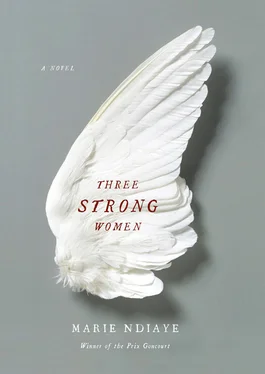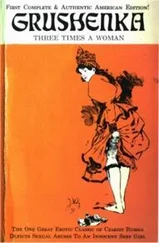He pulled up his T-shirt to show her the pinkish, slightly puffy marks on his back.
He’d gone to the lycée and failed the baccalaureate twice.
But he wanted badly to go on studying, he dreamed of becoming an engineer. (What did that mean? Khady wondered despite herself, trying hard not to get interested.)
When after a few days she made to remove the cloth protecting her calf, it was stuck so hard to the wound that she had to wrench it off, causing such pain that she couldn’t help crying out.
She wrapped a strip of clean cloth tightly around it.
She limped from one corner of the courtyard to another, trying to habituate herself to the hindrance, to train her body to cope with the slower pace and constant pain, until they became a part of her that she could forget or ignore by relegating it to the status of other merely circumstantial matters, like the painful stories of Lamine’s past, that served no useful purpose but merely risked deflecting and slowing down the still budding, precarious development of her thinking by insinuating into it elements of turmoil and uncontrollable suffering.
She similarly let her eyes flit across the faces of the people who arrived ever more numerous each day in the courtyard — and her look, she knew, was neutral, cold, and a permanent discouragement to anyone attempting conversation, not because she was afraid of being asked something (she had no fear of that) but because her mind panicked at the mere possibility of hearing about painful, complicated lives and being told at great length about things she found difficult to understand since she lacked the principles for interpreting matters in life that others seemed to possess as a matter of course.
One day the boy took her through narrow, sandy streets to a barber shop where a woman in the back took photos of her.
A few days later he came back with a worn, creased, blue booklet that he gave Khady, telling her she was now called Bintou Thiam.
His eyes had a look of pride, triumph, and self-assurance that put Khady slightly on guard.
She had a passing feeling that she was becoming feeble again and subject to the decisions, knowledge, and inscrutable intentions of others. Through sheer weariness she was briefly tempted to accept this subordination, to stop thinking about anything and to let her mind once again drift in the milky flow of its dreams.
Feeling a little disgusted, she pulled herself together.
She thanked the boy with a nod.
She felt terrible shooting pains in her calf that made it hard for her to think straight.
But though still determined not to discuss money unless he did, she couldn’t ignore the issue, nor the fact that Lamine had bought a passport for her and was behaving as if it were obvious that she had no money, or that one way or another she’d pay later — that worried her to the point that she sometimes wished he’d disappear, vanish from her life.
But she was becoming attached to his eager features, his adolescent voice.
She surprised herself by looking at him with pleasure, almost with tender amusement, when, hopping about the courtyard like the delicate birds with long spindly legs that she remembered seeing as a child on the beach (although she thought she couldn’t now remember what they were called, she could see that everything had a name even if she didn’t know it, and realized with embarrassment she’d once believed that only those things whose names she knew possessed one), he moved from one group to another, busying himself with a spirited, childlike innocence that inspired confidence.
He was possessed of a particular intuition.
She was beginning to grow impatient, but never for a moment thought to complain about it, when he announced they’d be leaving the next day. It was as if — she thought — he’d guessed that without realizing it she was starting to get bored, and had decided it was a bad thing: but why?
What could that matter to him?
Oh, she certainly felt affection for the boy.
That night, in the darkness of the courtyard where they were lying, she felt him moving close to her, hesitantly, as if unsure of her reaction.
She didn’t rebuff him; rather, she encouraged him by turning toward him.
She pulled her batik up and, carefully rolling the banknotes in them, slipped her panties off and laid her head on them.
It was years since she’d made love: not once since her husband’s death.
She carefully stroked the boy’s heavily scarred back and was surprised at the same time by the extreme lightness of his body and by the almost excessive gentleness and delicacy (because she could barely feel he was there) with which he moved within her. Almost as a reflex, recalled by the sensation of a body on top of hers, even one so different from her husband’s compact, heavy frame, there came back to her the prayers to be got with child which she’d never ceased murmuring at the time and which had prevented her having an orgasm by distracting her from the necessary concentration on her own pleasure.
She vehemently chased all such prayers away.
She was filled with a kind of well-being, a sort of physical comfort — nothing more pointed than that, nothing at all like what her sisters-in-law giggled and sighed about between themselves — but it made Khady feel happy and grateful to the boy.
As he pulled away from her he inadvertently bumped against her calf.
An explosion of pain tore through Khady.
She was panting and almost fainted.
She could hear Lamine murmuring anxiously in her ear and — suffering so much that she felt surprised, almost detached, a stranger to a self that was in such violent pain — she said to herself, Who ever cared about me the way he does, this lad, and so young too! I’m lucky, I’m really lucky …
Before dawn they clambered onto an open-bed truck where so many people were already huddling that it seemed impossible for Khady to find any room for herself.
She perched on a pile of sacks in the back, high up above the wheels.
Lamine advised her to grip the string on the packaging firmly so as not to fall off.
He was sitting astride a box right next to her and Khady could smell on their arms, pressed close together, the slightly sharp odor of his sweat mingling with hers.
“If you fall, the driver won’t stop and you’ll die in the desert,” Lamine whispered.
He’d given her a leather flask filled with tepid water.
Khady had seen him give the driver a wad of bills, explaining that he was paying for her too, then he’d helped her onto the truck, since her leg seemed to have become so heavy she couldn’t manage it alone.
Lamine’s barely contained excitement — which he attempted to conceal by fussy, precise gestures (such as frequently checking that the top of the water bottle was screwed on tight) and by continual warnings, repeated in a soft, slow voice (“Hang on tight, if you fall off the driver won’t stop and you’ll die in the desert”) — she could sense from the slight twitch of his face: she found herself infected by his slightly intoxicated eagerness, so that she felt neither afraid nor humiliated at being helped in the simplest ways by the boy, nor by the constant support he gave her, such as cupping his hands together to give her a leg up onto the truck; none of that called into question the idea she now had of her own independence, of being free from constraints imposed by the will of others. In much the same manner she endeavored not to see, in the money that Lamine had given the driver on her behalf, anything that amounted to a personal commitment on her part.
For Khady Demba, all that was of no consequence.
If it pleased Lamine to play a crucial role in her liberation, she was sincerely grateful to him for that — yes, she felt a great deal of affection for the boy, but it didn’t make her accountable in any way.
Читать дальше












